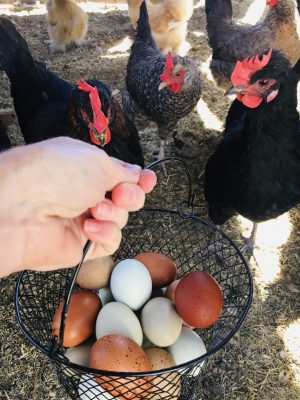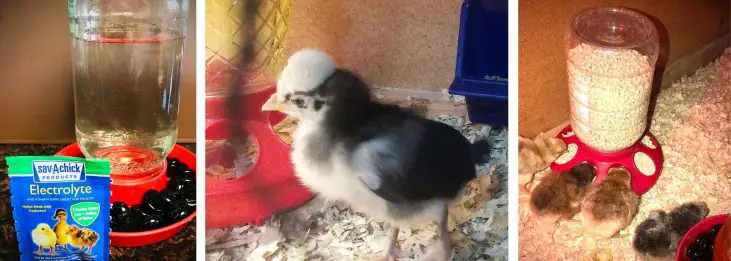
Knowing how to properly feed baby chicks can mean the difference between an unhealthy chick and one that thrives. Discover how to feed your little fluff balls, what is ok to feed them, how much and when to start giving them treats and progressing them to a layers feed.
Food and Water Placement
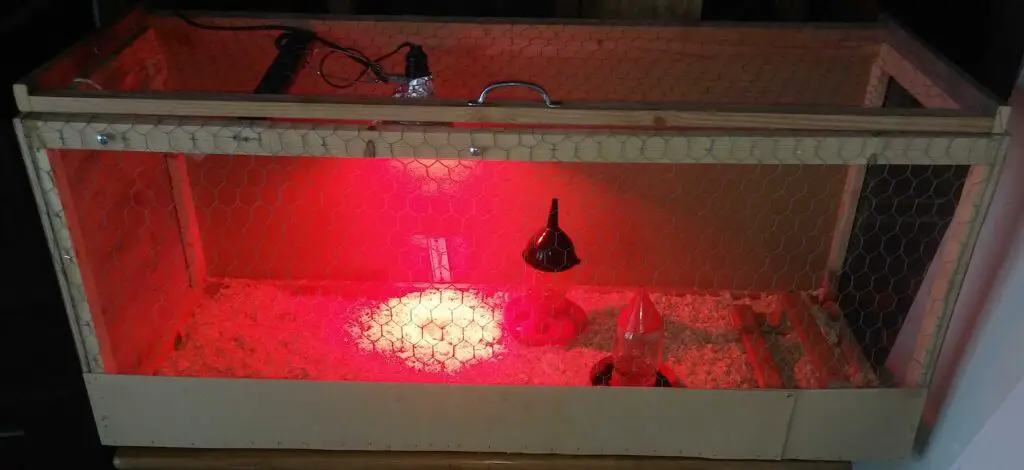
Pro Tip #1: For the first couple days, warm your baby chicks water to 98°. After this, they will be just fine with room temperature water. Cold water can be a shock to their system and lower its body temperature.
Pro Tip #2: Use water containers that do not allow the chicks to stand in it and place marbles inside of it to prevent the baby chicks from accidentally drowning.
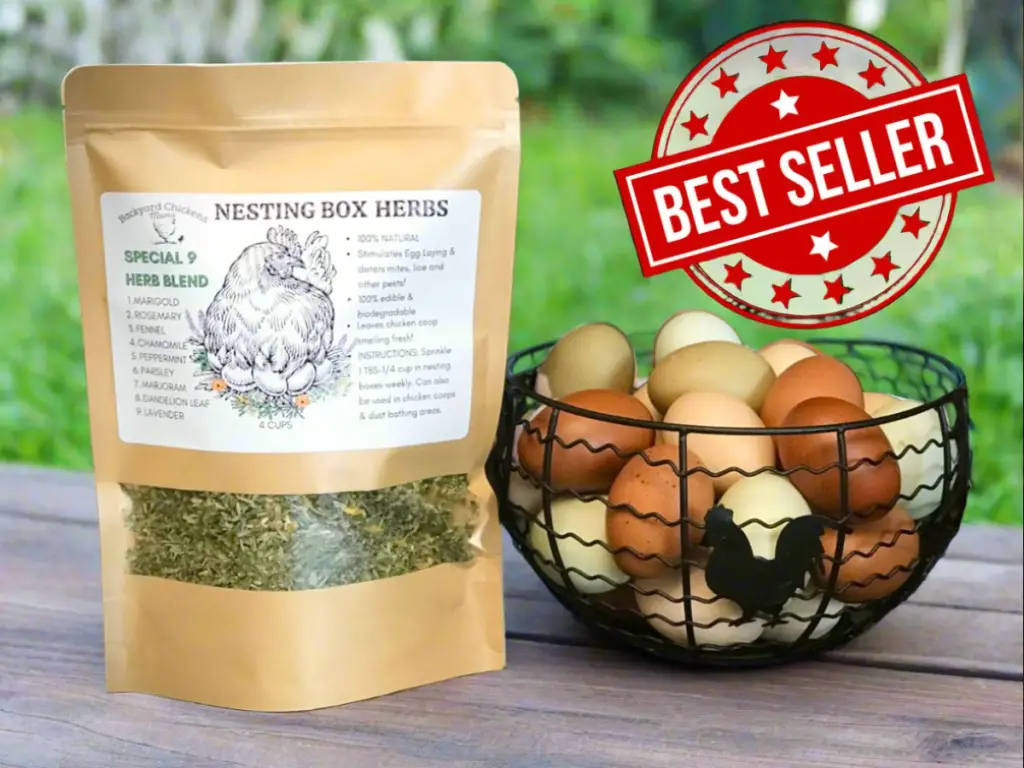
Increases egg laying naturally.
- Improves chicken health.
- Deters parasites: mites, lice, fleas, flies & rodents.
- On SALE!
- SHOP NOW
Pro Tip #3: Food should not be placed directly under or too far away from the heat source. It should be placed just out of the direct heat. This way, chicks can maintain their body temperature while eating, but not become overheated.
Pro Tip #4: Water placed too close to the direct heat source will be too warm for your chicks. Place it just outside of the direct heat, but not too far away that they get cold. As they grow in feathers, you can move both the food and water farther away.
Why do Chicks Poop in Their Water?
Chicks frequently poop in their water because they like to perch on top of the water container. They do the same to their food. You will find that you will have to clean out the water container frequently to keep it clean.
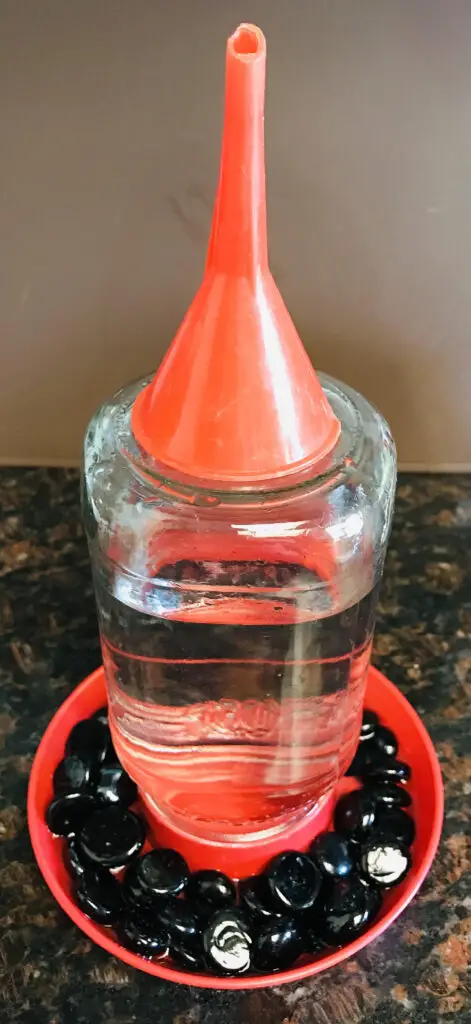
Pro Tip #5: Place a clean oil funnel on top of the chicks food and water containers to stop them from perching on top and pooping into its food and water.
Pro Tip #6: Elevate the water container slightly to prevent them from pooping in it. Just make sure they are able to reach the water. It shouldn’t be higher than shoulder height. This also helps minimize the bedding from being kicked into the food and water.
Can Chicks Drink Dirty Water?
Chicks will drink dirty water, even if it is filled with poop and their bedding, but it is not recommended. They will drink more water if you provide them with clean, fresh water throughout the day. The first few weeks, you will find that you need to change the water a few times a day in order to keep it clean.
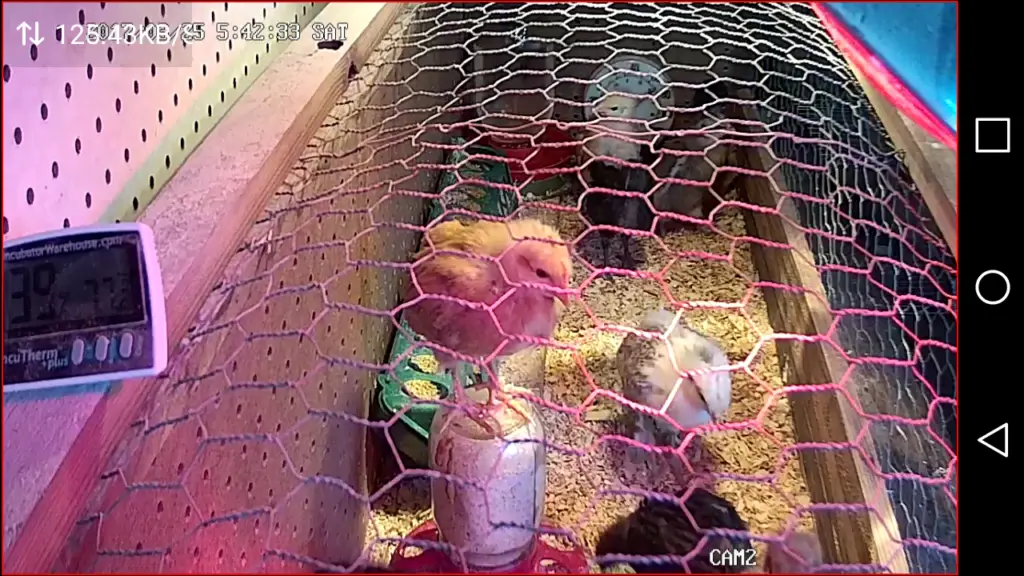
Pro Tip #7: As chicks grow, they like to perch up as high as they can. Provide perches that allow this, they will be less likely to try to perch on top of their food and water.
Electrolytes for Weak Chicks
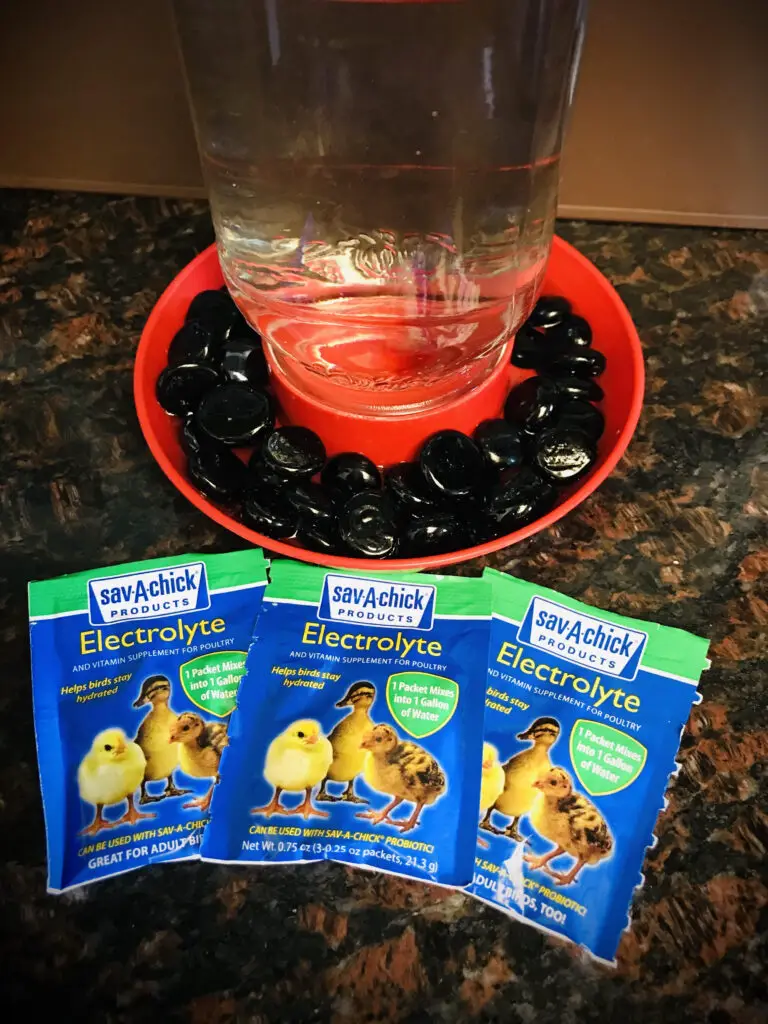
Observe each of your chicks and make sure that they are both eating and drinking normally. Watch for diarrhea and weak chicks. Healthy chicks should be eating, drinking and moving around.
Healthy, thriving baby chicks do not to be supplemented with electrolytes. It is good to give during times of stress, if they have gone for awhile without food or water, during illness or if they have diarrhea.
If you find you need to give it to your chicks, read the instructions on the packet and add it to 98℉ warmed water. Room temperature water is still too cold and will be a shock and stress to their system.
Pro Tip #8: If you have weak or stressed chicks, you can add a little electrolytes to the water to give them a little “pick me up.” Always read the instructions for dosage on this. More is not better with electrolytes!
Recommended Food and Water Containers
For newly hatched chicks, I highly recommend the chicken waterers and feeders that you can screw your own mason jar or mayonnaise jar onto. They are durable, inexpensive and easy to clean. I purchased mine through Amazon many years ago and they are good as new still!
You will find that as the chicks grow, they will eat and drink more and you will need to refill their food and water containers more frequently. It is important to thoroughly wash the water container daily to stop bacteria from growing inside.
1-6 Weeks: Always Have Food and Water Available
Baby chicks 1-6 weeks of age should always have access to food and water. During this time they are growing so rapidly and being deprived for even a short period of time can affect them.
Pro Tip #9: The first day you place your new baby chicks into their brooder, gently dip their tiny beak into the water and set them down next to it. This will teach them where to find water.
How Much Water Does a Baby Chick Drink?
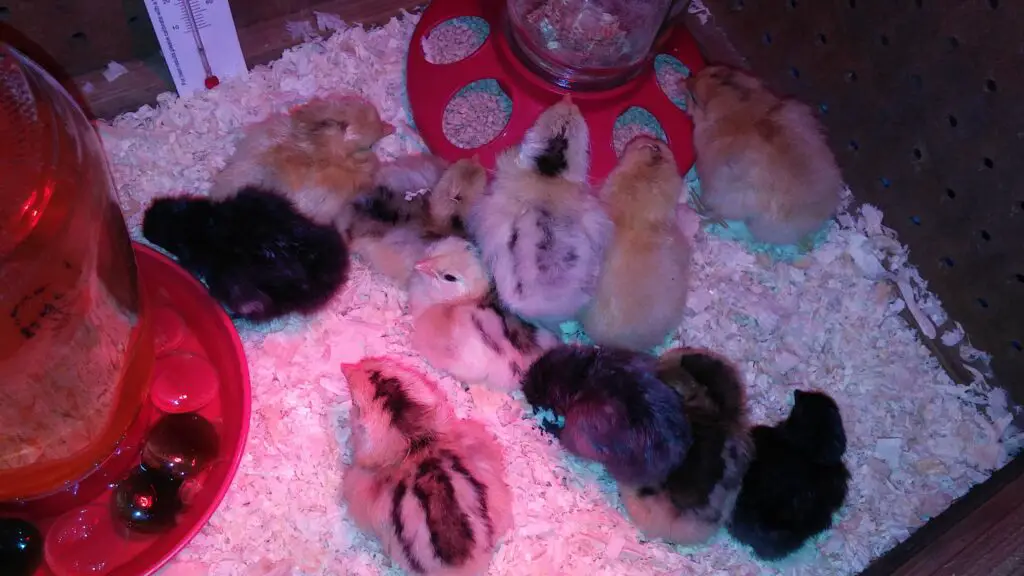
Baby chicks will drink up to twice as much water than the amount of food they are eating. This means that if they are eating 2 oz of food per day, they will need to drink 4 oz of water. Each week, growing chicks will require more water and you will find that you need to refill their water more frequently.
Pro Tip 10: Always have fresh food and water available for young, growing chicks. Young chicks will begin by eating about 1 oz of feed a day, gradually eating more until they are eating 4 oz (1/4 cup feed) as a full grown chicken.
| FOOD/DAY | WATER/DAY |
|---|---|
| 1 oz | 2 oz |
| 2 oz | 4 oz |
| 3 oz | 6 oz |
| #CHICKS | WEEKS 1-6 FOOD/DAY |
|---|---|
| 1 | 1-3 OZ |
| 6 | 6-18 OZ |
| 12 | 12-36 OZ |
| 18 | 18-32 OZ |
| 24 | 24-72 OZ |
| #CHICKS | WEEKS 1-6 HOW MUCH WATER/DAY? | RECOMMENDED WATERER SIZE |
|---|---|---|
| 1 CHICK | 2-6 OZ | 1 QUART |
| 6 CHICKS | 12-36 OZ | 1.5 LITER |
| 12 CHICKS | 24-72 OZ | (1) 1 GALLON |
| 18 CHICKS | 32-108 OZ | (2) 1 GALLON |
| 24 CHICKS | 48-144 OZ | (2) 1 GALLON |
Pro Tip #11: Switch the chicken waterers out in the morning and in the evening before you go to bed a night. This way your chicks will always have fresh water.
Pro Tip #12: For flocks larger than 12 chickens, it is best to provide multiple food and water stations. This will decrease the amount of fighting, especially when trying to establish their pecking order.
Recommended Food for Chicks
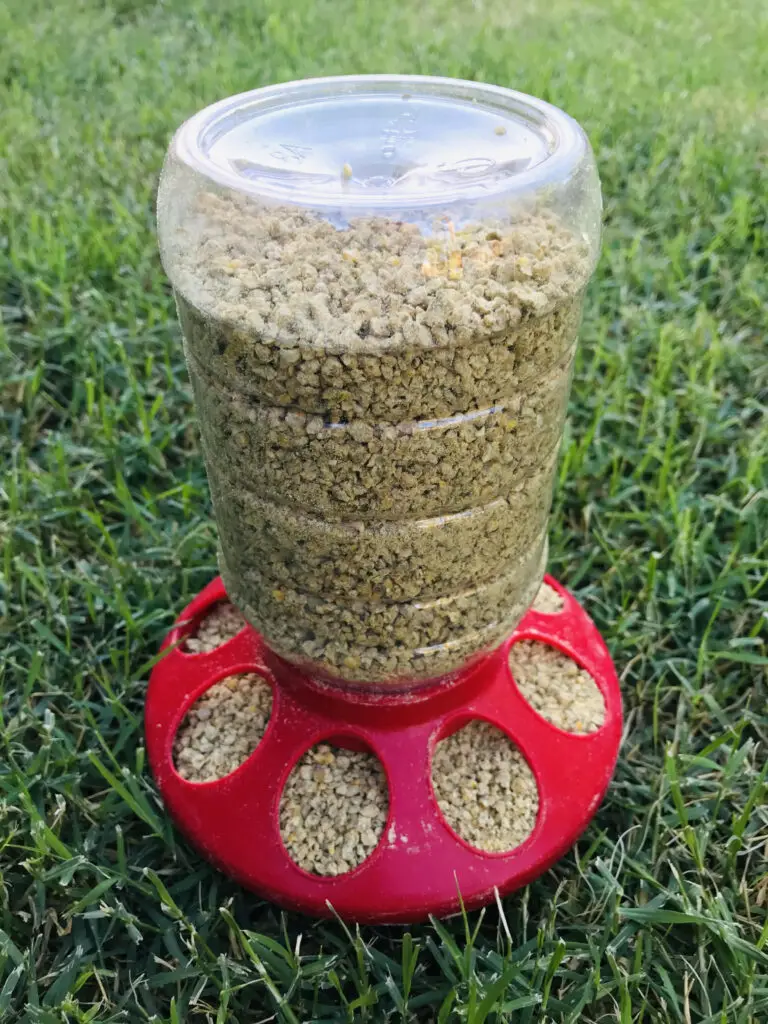
A chicks main diet should consist of chick starter crumbles which should contain 18%-20% protein. Baby chicks need the highest amount of protein to support their quickly growing bones, muscle development and new feathers that they are growing in.
A meat chickens diet requires a higher protein content, at 20-22%.
You can ferment chick feed to “unlock” additional nutrients for them. For more information on how to ferment chick feed, read my article How to Ferment Chicken Feed – 6 Simple Steps (Photos).
Medicated or Non-Medicated Chick Starter?
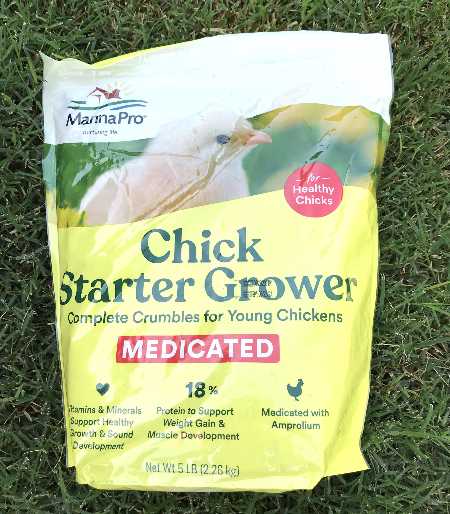
If your baby chicks have already been vaccinated against coccidiosis, then it is not necessary to feed a medicated chick starter. Chicks that have not been vaccinated for this should be given medicated chick starter that contains Amprolium to slow the growth of oocysts.
Coccidiosis can be fatal to young chicks. It is a parasite that attacks the chicks intestines, resulting in bloody diarrhea, lethargy and lack of appetite. It is extremely contagious to the rest of the chicks.
Pro Tip #13: Feed medicated chick starter feed for the first 2 weeks, then switch over to non-medicated. This is what I do and I have never had a problem with coccidiosis doing this. I use the Manna Pro brand. I highly recommend buying it on Amazon though, it is way cheaper!
How Much Do Baby Chicks Eat?
Chicks will eat up to 1 lb each of feed a week. A newborn chick in its first week will not eat quite one pound of feed, but as it grows it will eat more and more. The first 6 weeks you will need about 1 lb of feed per chick for each week. A full grown chicken will eat about 1/4 cup of feed a day or 1.75 lb per week.
| #CHICKS | WEEKS 1-6 FOOD/WK | 6 WEEKS OF FEED |
|---|---|---|
| 1 | 1 LB | 6 LB |
| 6 | 6 LB | 36 LB |
| 12 | 12 LB | 72 LB |
| 18 | 18 LB | 108 LB |
| 24 | 24 LB | 144 LB |
Feed stores sell non-medicated chick starter in 50 lb. bags for around $17. So for 6 chicks, you can get away with only needing one bag of feed for the first 6 weeks.
What is Chick Grit?
Chick grit if finely chopped up rock fragments that is fed to chicks under the age of 8 weeks to help them digest bugs, seeds and other treats that they may be fed or while out free ranging.
For more information on the chicken digestive system and how long it takes for a normally functioning crop to empty, read my article Chicken Sour Crop – How to Best Cure.
Is Chick Grit Necessary?
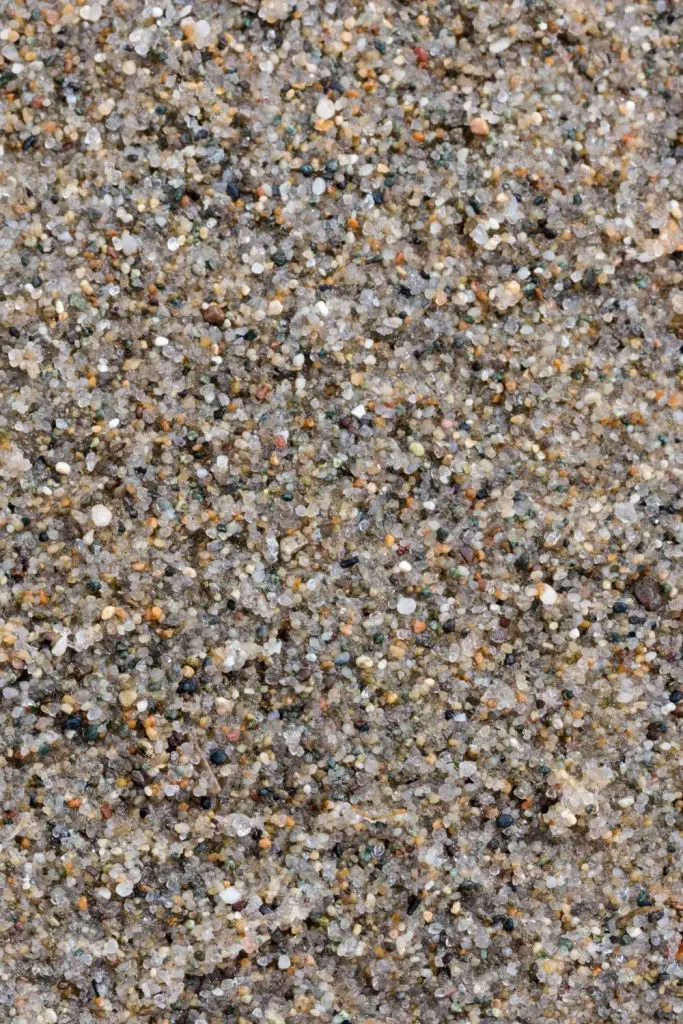
If you are only feeding your chicks chick starter feed and not supplementing with any treats, then it is not necessary to give them chick grit. Chicks that are still in the brooder, but given occasional treats should be provided with chick grit on the side.
You can also use children’s play sand.
Where do You Put Chick Grit?
Pro Tip #14: It is best not to add it to their food. Instead, offer it on the side or sprinkle it on the ground of the brooder. This way, they will only consume as much as is needed for digestion.
Feeding Baby Chicks Treats
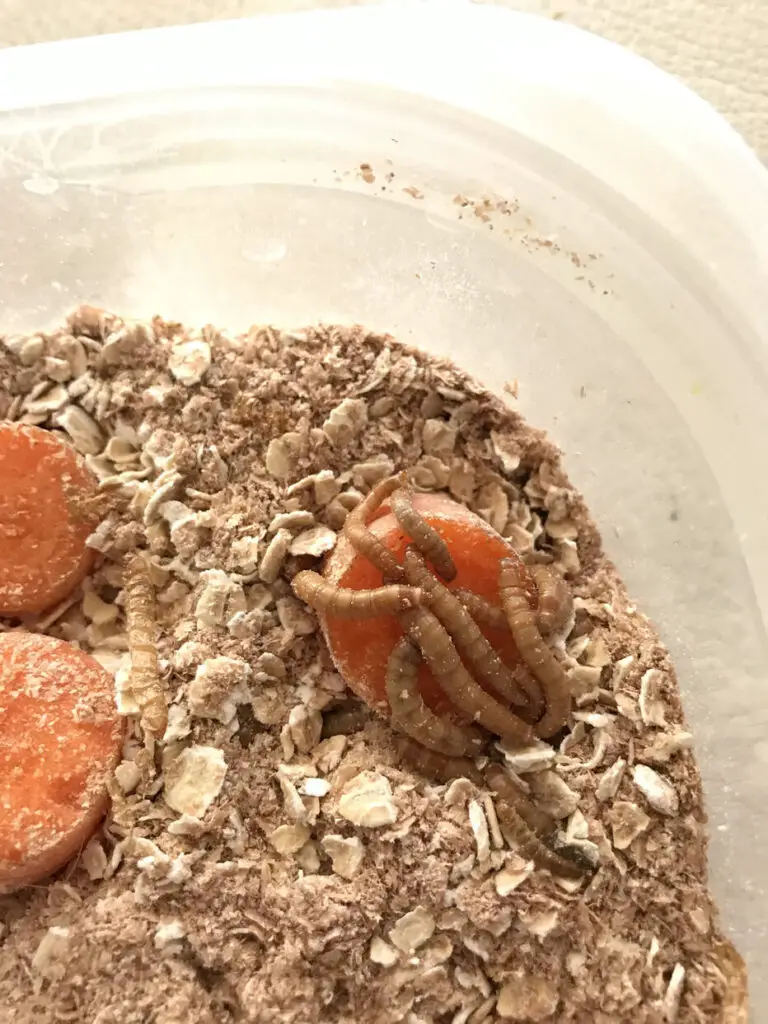
Pro Tip #15: For the first week, it is best to stick to just the chick starter feed. Let them become accustomed to their main feed before introducing treats. This feed is nutritionally balanced to provide them the nutrients that their body needs to thrive. For the second week, it is ok to gradually introduce new treats to their diet.
What Treats Can I Feed Chicks?
Watching chicks eat treats is so much fun! Week 2 you can begin offering treats to your chicks. Make sure they are being provided with chick crumbles at all times, so they do not fill up on the treats. Treats should not make up more than 10% of their daily food intake.
| EGGS | CHICK SCRATCH |
| YOGURT | MELON |
| COTTAGE CHEESE | LEAFY GREENS |
| MEALWORMS | GARDEN BUGS |
| FODDER | WEEDS |
| PINHEAD CRICKETS | BERRIES |
| SQUASH | BANANAS |
| PUMPKIN | CUCUMBERS |
| DRIED OATMEAL | SOFT CARROTS |
Thinking of feeding your chicks table scraps? Read more about it, Is it Safe to Feed Chickens Table Scraps? 5 Important Tips.
Pro Tip #16: Dried oatmeal is a great treat to feed to baby chicks to avoid them from developing “pasty but.” This is safe to give during their first week, in moderation.
When to Switch Feed
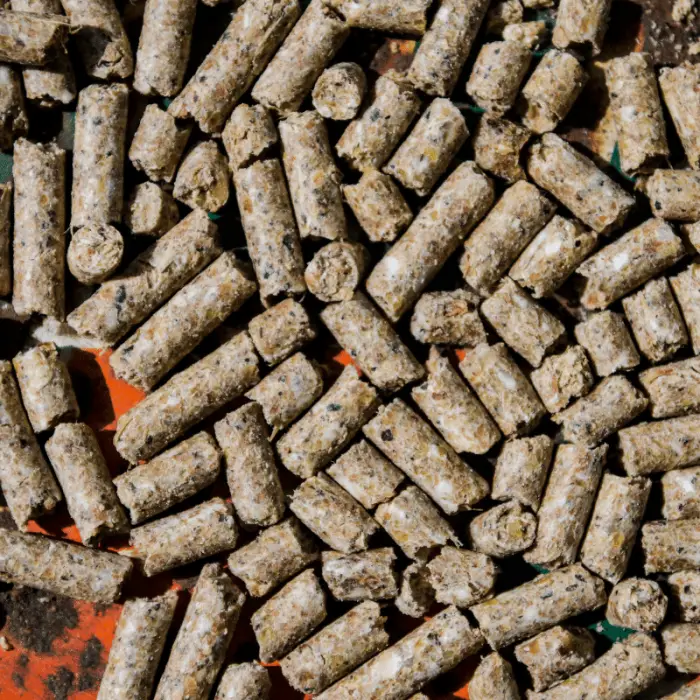
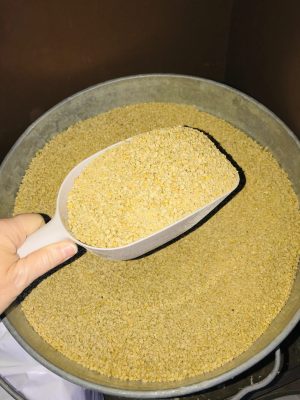
When a hen begins to lay eggs, it is time to switch her feed to layers crumbles or pellets. This usually happens around 18 weeks of age. If you have one hen in your flock that begins laying at 16 weeks then it is ok to gradually switch the whole flock over to layers feed.
Pro Tip #17: When switching from chick crumbles over to layers feed, begin by mixing what you have left over of your chick crumbles with layers crumbles. This way, it is less stress on their digestive system. After you finish the bag of layers crumbles, you can switch over to the laying pellets, if you prefer.
There isn’t a nutritional difference between the layers crumbles and pellets. The crumbles are just crushed up pellets. Some prefer the pellets and find that they are not as messy.
If you are thinking of getting baby chicks, it is important to know how to recognize a healthy vs. unhealthy baby chick. For more information on this, read my article 5 Best Tips- How to Choose Healthy Baby Chicks.
CONCLUSION: 17 Pro Tips – How to Properly Feed Baby Chicks
Raising chicks is really a very rewarding and fun experience for the whole family to get involved in! Knowing what you are getting yourself into and preparing ahead of time will make it so much easier. By following these 17 pro tips, you will know how to properly feed your baby chicks and they will thrive!

